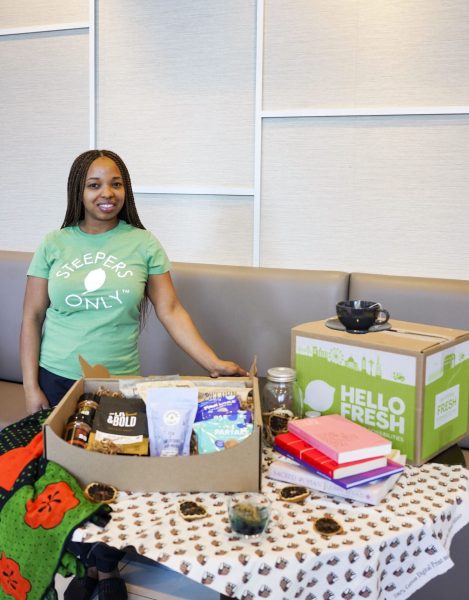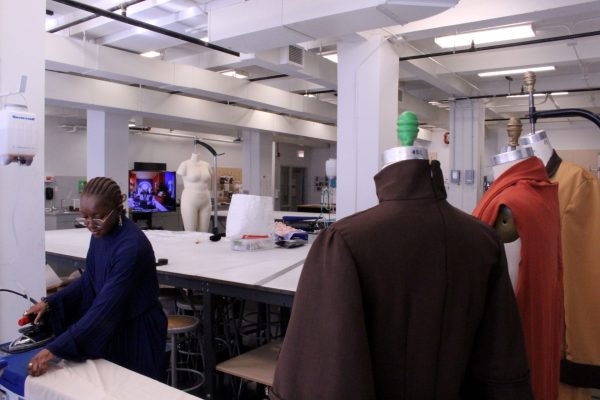The best kinds of face masks to purchase, according to health experts
Sam Kelly/Chicago Sun-Times via AP
A lion statue with a mask placed on it at the Art Institute of Chicago.
The era of the face mask has become a new normal in the windy city. Now a fashion trend and method of self-expression, residents are seen wearing masks with the logo of their favorite sports team or even childhood characters, such as Hello Kitty.
But, health experts advise that not all face masks are meant for the public and we should be aware of which ones are purchased.
“Unless you are a healthcare provider or immunocompromised, you should not be using medical-grade masks [such] as N95, N99, [and] surgical masks,” said Craig Klugman, expert in medical research and professor at DePaul’s College of Science and Health.
Klugman mentioned that N95 masks and other surgical masks are meant to protect the wearer from small aerosolized particles, like the virus, meaning that it has to be specially fit to filter out 95 percent of particles and should be used by those who are taking care of COVID-19 patients.
According to CDC guidelines, those types of masks are “critical supplies that must continue to be reserved for healthcare workers and other medical first responders.”
Klugman says that tight woven cloth masks that are made from heavier fabrics are better for the public and can be easily made.
“Whether you make your own or buy one made by someone else; [it] does not really matter,” he added.
As to the difference between masks with and without a filter, Klugman highlighted that all masks do have a filter of some sort and that its “filter rating” will determine what size particles it blocks from flowing through.
“Some cloth mask designs include a filter for a pocket, but given that the homemade kind fits fairly loosely, the filter may not add much additional protection,” he said. “The CDC has said using a coffee filter might be helpful in between two layers of tight-weave cotton fabric.”
To appropriately wear a cloth face mask or “cloth face covering,” the CDC stated that these masks should:
- fit snugly but comfortably against the side of the face
- be secured with ties or ear loops
- include multiple layers of fabric
- allow for breathing without restriction
- be able to be laundered and machine dried without damage or change to shape
“The major benefit of wearing a mask is to protect yourself from inhaling germs,” said Jay Baglia, expert in health disparities and professor at DePaul’s College of Communication. “The way the virus can travel through the air is still being explored but at issue is whether the virus can travel further than originally thought.”
The city of Chicago has not yet reached its peak in COVID-19 cases, and because of this, experts say that you should still wash your hands and adhere to social distancing guidelines – regardless of where you buy your mask. In other words, continue practicing good hygiene and keep your distance to maintain your health and the health of others as priority.
“Because of a lack of testing, we actually do not know the infection rate and without that information we do not know the mortality rate,” Klugman said. “It appears the virus is lethal to people who are immunocompromised and people with chronic diseases. The pandemic is showing the social injustice and inequity that exists in our society and our health care system. Thus, we have to stay at home to protect those who are vulnerable.”
To continue protecting those who are most vulnerable, Mayor Lori Lightfoot and the Chicago Office of Emergency Management and Communications (OEMC) have also launched a citywide cloth mask drive beginning Saturday, April 25 through May 16, allowing residents to make and donate homemade cloth masks to first responders and others in need.
These homemade masks can be assembled with the following supplies:
- Two 10”x6” rectangles of cotton fabric
- Two 6” pieces of elastic (or rubber bands, string, cloth strips, or hair ties)
- Needle and thread (or bobby pin)
- Scissors
- Sewing machine
If you are unable to make these masks at home, there are still masks available at these online sites, that are stylish and adhere to guidelines:
- Vida Protective Mask, $10
This mask is made up of 2 layers with adjustable straps and a PM2.5 Filter, that fits both adults and kids.
- Anthropologie, $14
These masks are made out of soft cotton fabric and contain open pockets which allow for the insert of your own filter of choice.
- Michael Stars, $20
This pack of face masks offer two reusable face masks made from cotton and recycled polyester.
- Alice + Olivia, $10
These masks are double-layered and are made with Jersey material for reuse, washability and comfort.
- Etsy, $12
This mask is made out of vintage cotton blend fabric, containing 3 layers with elastic straps and wiring that will accomodate to the size of your nose and contour of your face.
For face mask safety tips and more information visit: https://www.cdc.gov/







Kaka Wang • Jun 1, 2020 at 12:11 am
Dear Sir/Madam,
We are a manufacturer which produces KN95/FFP2 face mask in China. The attachment is our factroy’s videos.
Please feel free to contact us if There is any inquiry. whatsapp: 008618057943188, 6630635@qq.com